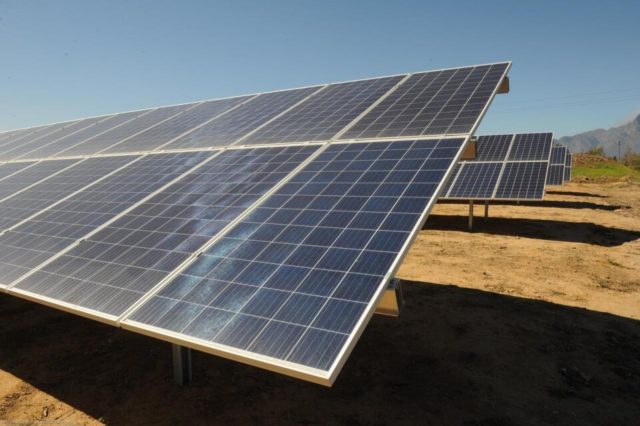The Industrial Development Corporation announce that through its funding support to H1 it is part of the creation of what is set to become one of the world’s largest hybrid solar PV and battery storage facilities.
FOLLOWING on its existing R15.6 billion investment in the South African renewable energy sector, the Industrial Development Corporation (IDC) has announced that through its funding support to H1 it is part of the creation of what is set to become one of the world’s largest hybrid solar PV and battery storage facilities.
H1 is a black economic empowerment (BEE) group and is the empowerment partner to Norwergian renewable energy manufacturer Scatec in the development of a solar PV and energy battery storage facility in the Northern Cape.
Construction of this facility is set to commence following the three Scatec Kenhardt projects having reached financial close on July 18, 2002.
In a statement the IDC said that the investment in the project is one of the corporation’s landmark investments in the renewable energy space. Since 2012, the IDC’s exposure in the renewables space is north of R15.6bn.
DC divisional executive for mining, metals, infrastructure and energy, Reginald Demana said, “the IDC is very excited to be one of the funders of this project. This project speaks to the ethos and mandate of what the corporation stands for, which is the industrialisation of our economy, ensuring energy security, creation of jobs and playing a key role in facilitating meaningful transformation. For us, this is just one of many practical ways in which IDC contributes toward the betterment of our economy and the livelihoods of ordinary South Africans”.
Among the most salient features of this project, it will have an installed solar PV capacity of 540MW and a battery storage capacity of 225MW/1,140MWh. A notable aspect of this transaction is that this project will generate dispatchable power that will contribute to the country’s installed baseload capacity and is underpinned by a 20-year power purchasing agreement with Eskom.
The IDC has co-funded the H1 group to acquire a 49% equity in this venture, with Scatec owning the remaining 51% stake. This project will be a massive game-changer in the renewable energy sector. Once completed, the project will be able to supply 150MW dispatchable power to the grid from 05:00 to 21:30. In terms of scale, it is 10km wide, from side to side making it the largest of its kind in sub-Sahara Africa.
It will include about two million solar PV modules with construction expected to take just over a year subsequent to which power will be fed to the grid. Over 2,000 jobs are expected to be created during the construction period.
“Another attribute of this transaction is that it affirms the IDC’s commitment to broaden the pool of black industrialists looking to break into key sectors of the economy,” Demana added.
These projects are unique in that battery storage addresses the intermittency challenges of renewables – when there is no wind or no sunshine, then no power is produced. The projects are part of South Africa’s Risk Mitigation Independent Power Producer Procurement Programme (RMIPPPP), which was launched in August 2020. The programme aimed to procure about 2,000MW of generation capacity to help address the country’s energy supply constraints.
Reyburn Hendricks, CEO of H1 Holdings commented: “H1 is proud to play a role in providing benefit to the economy from an energy security perspective. We look forward to working with our funding partners, the IDC, as well as our development partner Scatec in making a contribution to meeting South Africa’s commitment to a lower-carbon energy system.“
Already there have been development benefits even before the business comes to fruition. Telecoms group Vodacom has set up a tower to enable communications at the facility and the greater Kenhardt region – an area which previously had no signal. Local communities and enterprises in and near Kenhardt will benefit through R444 million committed over a 20 year period to supplier, enterprise, and socio-economic development initiatives. The projects also commit to 40% local content during its construction and operation.
A significant portion of the projects are locally sourced, such as transformers and cables. Solar PV modules, trackers, and inverters are sourced partially locally and abroad. The lithium-ion batteries will be imported.
“This is an important milestone in the procurement of renewable energy and proves that the sector can be relied upon to deliver much-needed electricity capacity to the grid,” Jan Fourie, General Manager for Scatec Sub-Saharan Africa said.
– BUSINESS REPORT








